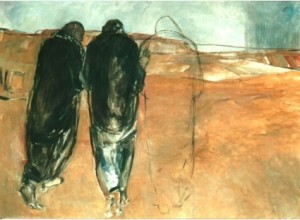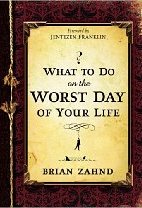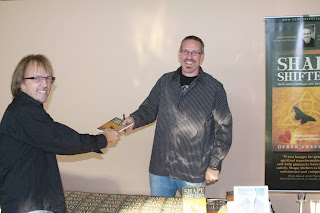Last weekend, I had the privilege of speaking at Word of Life Church in St. Joseph, Missouri in a pretty unique format. WOLC’s pastor, Brian Zahnd, set up a “kitchen table” interview with me, where he asked me questions about the Trinity. This was a part of his “Engaging Orthodoxy” series, a teaching series geared towards equipping people to engage in culture by being rooted and grounded in Christian orthodoxy, i.e. right believing regarding the Christian faith.
So we literally sat at a table on the stage and talked about the Trinity with coffee and Bibles in hand. We talked about theology, church history, baptism, creeds, heresy, orthodoxy, Jerry Seinfeld, and Bob Dylan…all in a 35 minute time slot. You can listen to the audio here. [You can also listen to the audio on the WOLC website. Click here to go to their archive audio and scroll down to “Engaging Orthodoxy – Part 4: The Trinity.”]
Brian gave me the list of questions and like some middle school over-achiever, I diligently wrote out answers to each question so that I would be prepared. As it worked out, I didn’t get to all this material. I spent some time working on some of these answers in order to make the very complicated doctrine of the Trinity easy to understand. So here are the notes in their entirety:
What is the Trinity?
“Trinity” is the word that Christians use to describe who God is.
In the Old Testament, God has revealed himself as one God.
In the New Testament, God has revealed himself as Father, Son, & Holy Spirit.
This is a bit of a mystery.
“Trinity” is the Church’s way of preserving this mystery, that there is one God, one divine substance, revealed in three persons—the Father, Son, & Holy Spirit. This was the language of the early church when speaking about God, “one substance” (Latin: substatia) and “three persons” (Latin: persona).
The doctrine of the Trinity is a gift from the historic Church to the modern Church.
How was the doctrine of the Trinity developed?
The doctrine of the Trinity grew out of worship and a devotion to Scripture.
Historically, it began with BAPTISM as you read in Matthew 28:19…baptizing them in the name of the Father and of the Son and of the Holy Spirit
In the early church, baptism was by immersion, often dipping the head three times while the person being baptized stood naked in the water. (I hope that was some murky water.) If there was not enough water for immersion, pouring water over the head was permissible. The water would be poured over the head three times. (Schaff, History of the Christian Church, Vol 2, pg. 248-249)
It was baptism, not just in God’s name, but into the name. There is a footnote in the ESV regarding this difference in translating Matthew 28:19. From a Jewish perspective, a name relates to a person character. And so we are not just baptizing people in the name of the Father, Son, and Holy Spirit, but into that name, into this mysterious community of Father, Son, and Holy Spirit.
From there, the Church began to use CREEDS in order to teach Christians basics…like the Apostle’s Creed.
Candidates for baptism would recite (or repeat) the Apostle’s Creed. The Creed was “the baptismal symbol.”
(Schaff, History of the Christian Church, Vol 2, pg. 248)
The ancient creeds used a Trinitarian structure for the Christian faith.
I believe in God the Father Almighty, Maker of heaven and earth…
And in Jesus Christ his only Son our Lord…
I believe in the Holy Ghost… (Apostle’s Creed)
Then the doctrine of the Trinity really began to take form in response to HERESIES. It has been said that, “heresy is the mother of all orthodoxy.” This was particularly true in relation to the formation of the doctrine of the Trinity. There were hundreds of years of debates asking, “How is God the Father, Son, and Holy Spirit.” Christian pastors wrote books and the church held Church-wide counsels and they ended up with this language: One substance, three persons, one divine essence revealed in three persons – Father, Son, and Holy Spirit.
How important was the doctrine of the Trinity to the early church?
It was absolutely critical.
The early Jesus movement was but one of dozens of new religions and it was important for the Church to clearly communicate who their God is. They were spread out through the Roman Empire who had a pantheon of gods. At first, they were considered a radical Jewish and so they had to separate themselves from Judaism. And they had a number of schisms among those who called themselves “Christians,” but disagreed on who God was.
So it was critical that they establish the uniqueness of the Christian God, who they believed (and we believe) is the one true living God. And God as a Trinity is unique. The media will talk about the three great monotheistic religions Judaism, Christianity, and Islam as if they are essential the same. God as Trinity is totally unique and unlike any other religious system.
Why do you think modern Christians aren’t so interested in the Trinity?
I think it is because many Christians in the United States are more interested in seeking God’s hand than seeking his face. They want to know, “What can God do for me?” Instead of “Who is this God?”
Michael Horton in Christless Christianity calls this “moralistic, therapeutic deism.”
Moralistic: people want to be better people, better husbands, fathers, employees.
Therapeutic: We want to feel better; we want God to give us goose bumps on Sunday morning
Deism: God is the maker of heaven and earth, but he has no contact or interaction with his creation
Many who claim to be followers of Christ don’t want to take the time to seek God’s face in a serious way.
And for churches like yours and mine…we are hip, young, cool, and contemporary…we want to know what God is doing now…we don’t have much interest in knowing what God has done in the first couple hundred years of the church.
Are there dangers in our unwillingness to think seriously about doctrine?
Yeah I think so. Look at the history of the Roman Catholic Church in the late middle ages.
The Reformation of the 16th century was necessary, because the church had gotten so far away from biblical Christianity; it was a mess.
It is easy for Christians living at anytime to absorb the values of the dominate culture.
Thinking seriously about doctrine helps you discern biblical truth from cultural error. It is so easy to replace biblical values with cultural values.
We are living in a consumer culture. It is easy to baptize American consumerism and make it sound Christian.
I am not selfish and greed; I just want God to do whatever I say when I say.
What are some of the wrong ways people think about the Trinity?
There are essential two wrong ways of thinking about the Trinity and it is to err on one side or the other…to either see God and a monad….one in his person or to see the Father, Son, and Holy Spirit as three Gods.
Historically, these heresies are called modalism and tri-theism.
Modalism sees to God as taking on three modes…wearing three masks.
You see this presently in the United Pentecostal Church–“Oneness Pentecostals” or “Jesus Only Pentecostals”.
Tri-theism is a polytheistic view of God. That there are three Gods.
A polytheistic view of God is found among Jehovah Witnesses and in Mormonism.
Both of these are heresies that have been condemned by the Church.
Why do we call wrong thinking about the Trinity heresy?
Ultimately we call it heresy because it is inconsistent with the teaching of the apostles, which we know as the New Testament.
Building any kind of theological framework like the doctrine of the Trinity requires that we build it big enough to hold all of what the Scripture says about God. There is no doubt that the Scripture reveals God to be one. There is only one God. But was we look at the teachings of Jesus, he himself claims to be God. And they way Paul speaks of the Holy Spirit indicates he is God too.
Either heresy requires us to ignore certain Scriptures are simply force them to say something that the biblical author’s did not intend.
What are some analogies of the Trinity?
The early church used analogies to try to describe the Trinity. Tertullian of Carthage actually coined the term “Trinity” used two in particular.
Tree as trunk, branches, leaves
Moving water as a river, stream, and creek.
Some modern analogies include: Water in three forms: solid, liquid, vapor.
Football team: offensive, defense, and special teams
A person as husband, father, & pastor
A hot, cherry pie cut into three large pieces
My favorite may be an analogy from music. In a 2007 Rolling Stone interview, Bono was describing his appreciation for the Beatles. He described their music as “an intoxicating mix of melody, harmony and rhythm.” (As quoted by Roderick T. Leupp, The Renewal of Trinitarian Theology, 2008, pg. 9)
Do analogies accurately explain the Trinity?
No. All human metaphors fail at some point.
Consider the music analogy. This is a good one. Melody, harmony, and rhythm are a distinct, but together they make up a song. They are three distinct faces to the one song.
As good as this analogy is, it does have its problems when relating back to the Trinity. The orthodox position is that the Father is fully God, the Son is fully God, and the Spirit is fully God. The melody is not fully the song and harmony and rhythm alone, are not “the song.”
There is really nothing in creation that is like the Trinity, which is consistent with what the Bible says about God. He is holy, i.e. separate, different, other.
There is nothing in creation like the Trinity, because if there was then it would be the Trinity.
Is the doctrine of the Trinity easy to understand?
No, but it isn’t supposed to be. The early church began to speak of God as a Trinity not to explain the mystery, but to preserve the mystery.
The Church confidently believes this is who God has revealed himself to be…this mysterious community of persons – Father, Son, and Holy Spirit.
It is a mystery that we embrace.
It is a mystery that we explore.
I grew up in Myrna Manor North, just a few miles from this building. In the back of our neighborhood there is a creek and large wooded area. The woods were mysterious…beckoned us to go exploring.
One early church father expressed his worshipful exploration of the mystery like this:
“No sooner do I conceive of the one than I am illuminated by the splendor of the three; no sooner do I distinguish them than I am carried back to the one. When I think of any one of the three I think of him as the whole, and my eyes are filled, and the greater part of what I am thinking escapes me. I cannot grasp the greatness of that one so as to attribute a greater greatness to the rest. When I contemplate the three together, I see but one torch, and cannot divide or measure out the undivided light.”
—Gregory of Nazianzus, (330-390 AD)
Orations (40.41)
Should we be suspicious of doctrines which are difficult to comprehend?
Not when it comes to God.
A God who is easy to understand is a popular god, because it is a god we can control, a God we can master.
But if God is the holy, infinite, eternal God as declared in the Scripture than shouldn’t he be difficult to comprehend? A God who is easy to understand isn’t a God who demands my worship. The kind of God is a god who demands my boredom. I seriously believe this is why some Christians become shipwrecked in their faith. Their god is too small.
A difficult and demanding doctrine like the Trinity humbles us and demands our worship.
“In the presence of this mystery, we are no longer in a position of control where we can manage or master the subject. Before this Subject, worship is more appropriate than problem solving, awe is preferable to answers. So the mystery of the Trinity ought to evoke in us humility and worship—the very attitudes necessary for entering the circle of triune fellowship.”
—Steve Seamands, Ministry in the Image of God, pg. 103
What does the Trinity say to us about community?
“At the center of the universe there is a relationship.” (Darrell Johnson, Experiencing the Trinity, pg. 37)
We know that God is love.
(1 John 4:8)
There is no biblical understanding of love without other people.
You can love your car, your cat, your dog and even your goldfish, but that is not the biblical definition of love.
It is not love without other people.
God is love, because for eternity there has been love between the Father, Son and Spirit. These three persons have been loving each other since before there was time.
“It is common when speaking of the Divine happiness to say that God is infinitely happy in the enjoyment of Himself, in perfectly beholding and infinitely loving, and rejoicing in, His own essence and perfection…”
–Jonathan Edwards, Unpublished Essay on the Trinity
And this love draws me in. The Father sent his Son to build a community.
The Father, through the Son sends the Spirit in invite us into this community, where we will never be alone.
What about the Shack?
The best thing that happened to The Shack, outside of an endorsement from Eugene Peterson, was all of the criticism and negative backslash it received. I am still waiting for some friends to create an Anti-Shape Shifters website to help promote my book!
I think The Shack is a wonderful introduction to Trinitarian life. Some say The Shack has an anti-authority vibe and a very low view of the church…and I can see that. But remember The Shack is a work of fiction and not systematic theology. It has its flaws, but it is a good way to see the love between the Father, Son, and Spirit.
Why does it matter? What does the Trinity have to do with our everyday lives?
In Shape Shifters, I give seven reasons why I am a Trinitarian Christian. But here is one: For me, it goes back to relationships.
I have had to confess a sin to my church. I have had a habit of running away from church members when I see them at Wal-Mart. When I go shopping at Wal-Mart, I am a man on a mission. I want to go in. Get my carefully selected items and then get out. And so I developed a habit of running from church members when I would see them at Wal-Mart. When I saw them coming one way, I would dart down an isle in order to avoid them.
This is a sin, because I was running from the very thing I was created for…relationships, right relationships with other people.
Why did Jesus say that the greatest command is to love God and to love our neighbor as ourselves?
Because this is a reflection of who God is. When we love one another, we are living out our “created-in-the-image-of-Godness.”
Paul’s Trinitarian Prayer:
I pray that out of his glorious riches he may strengthen you with power through his Spirit in your inner being, [17] so that Christ may dwell in your hearts through faith. And I pray that you, being rooted and established in love, [18] may have power, together with all the saints, to grasp how wide and long and high and deep is the love of Christ, [19] and to know this love that surpasses knowledge—that you may be filled to the measure of all the fullness of God. (Ephesians 3:16-19 NIV)
:::::::::::::::::::::::::::::::::::::::::::::::::::::::::::::::::::::::::::::::::::::::::::::::::::::::::::::::::::::::::::::::::::::::::::::::
For more information about the Trinity, I recommend the following books:
Shape Shifters by Derek Vreeland
Experiencing God by Darrell Johnson
Ministry in the Image of Godby Steve Seamands
Worship, Community, and the Triune God of Grace by James Torrance
The Renewal of Trinitarian Theology by Roderick Leupp
I also found Dr. Michael Williams’ lectures on the Trinity to be helpful. Williams is a professor at Covenant Seminary in St. Louis. I listened to four lectures on the Trinity from his “God and His Word” series. I listened to lessons 17-20 in preparation for this talk on the Trinity.

 This is the book I want with me when all hell breaks loose and I am battling the worst day of my life.
This is the book I want with me when all hell breaks loose and I am battling the worst day of my life.
